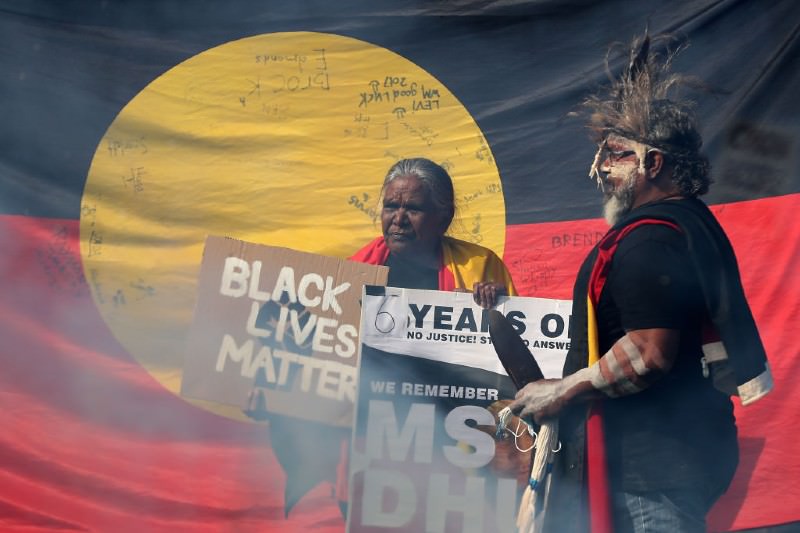- Brent Riley
- 25 June 2020
Strange times prevail us. The upheaval occurring in the United States is focusing a spotlight on the issues Aboriginal people in Australia have been facing for decades. Though I couldn’t help but feel that, at least initially the voices of compassion and support for Black lives in America, were silent in my homeland.

This changed when tens of thousands of Australians from all over the country and from all walks of life took to the streets to protest. Not only in support of the slain George Floyd, but also for the four hundred and thirty-seven lives lost to deaths in custody in Australia since 1991. It was overwhelming to see my fellow Australians marching in protest of the lives lost. It reminded me that while our media and government work to destroy my culture, there are still Australians who are willing to fight to save it.
People ask why it took the death of George Floyd to make so many Australians stand up. His experience mirrored that of so many Aboriginal people who have died while in custody. His dying words ‘I can’t breathe’ echo through our hearts, because this isn’t the first time a Bla(c)k man has uttered those words while being brutally arrested for a crime most white people would get a slap on the wrist for.
But what do I know?
I am a Murray man from the Kamilaroi tribe. My skin is white but my Aboriginality is a part of me. It runs deep, deeper than my skin colour. I don’t deny the colour of my skin still gives me a privilege that even my own family who are darker skinned do not have. I do not suffer the effects of interpersonal racism, but I still suffer from the absolute disrespect and destruction of my culture.
I worked for the Aboriginal and Torres Strait Islander Commission (ATSIC) for the last four years of its existence. This was an organisation ripped to pieces by the Murdoch media with half-truths, full lies and fear mongering. This was nothing new. When Eddie Mabo won the historic Native Title claim, the Murdoch media made sure to instil in everyone a fear that ‘the Aboriginals’ would be coming for your backyard next. How does one fight against such shameless sensationalism?
'It seemed obvious to me that preventing deaths in custody was not just about ensuring the safety of any Aboriginal person taken into custody, but to stop so many, mostly, Bla(c)k people from entering police custody in the first place.'
ATSIC gave a voice to the voiceless. No one in government was willing to stand with us and stand up for us, in fact since ATSIC’s inception there were many trying everything they could to abolish it. This desire came to fruition in 2004 when ATSIC was ruthlessly dismantled by then Prime Minister John Howard. I saw the voice we once had slowly being diminished until there was a deafening silence.
There has always been a commitment in this country by our government to erase its Black history. Even more so to simply ignore it. One only need look at the recent destruction of an historical Aboriginal cultural site in the Pilbara region of Western Australia. 46,000 years blasted away by greed at the hands of Rio Tinto and perfectly legal, because our government approves.
While working for ATSIC, I was tasked with putting together the ten-year anniversary forum to discuss the progress made in regard to the recommendations handed down by the Royal Commission into Aboriginal Deaths in Custody. I was stunned to find that of the three hundred and thirty-nine recommendations, only a handful had actually been implemented.
During this forum I heard from young Aboriginal people who, at the time, were locked away in juvenile detention. They spoke passionately about how a disconnection from their culture created an anger and frustration that often resulted in their being locked away. I walked away from this realising that it isn’t just lives that are being lost, but a culture as well. For these young people, being able to connect to the land and understand their place and importance within this was liberating. They suddenly felt they had a place, that they belonged to something. They felt whole again.
It seemed obvious to me that preventing deaths in custody was not just about ensuring the safety of any Aboriginal person taken into custody, but to stop so many, mostly, Bla(c)k people from entering police custody in the first place.
Fighting for equality and the lives of black men and women in Australia is a noble cause and a necessary one, but it is only the beginning. There needs to be an understanding of the brutality that has ripped away the cultural connection from all of us and a celebration of the beauty and mystery of a culture that is the heart of this country. If we want to save lives, we need to save the culture. To respect it and honour it as something special and sacred.
No comments:
Post a Comment